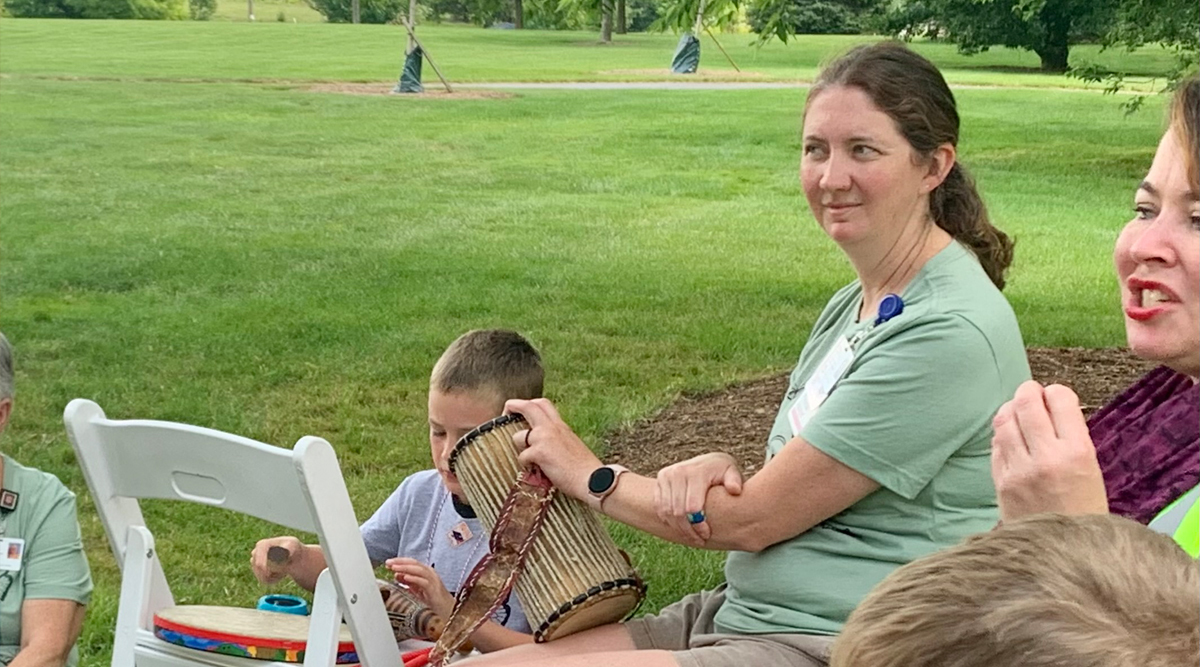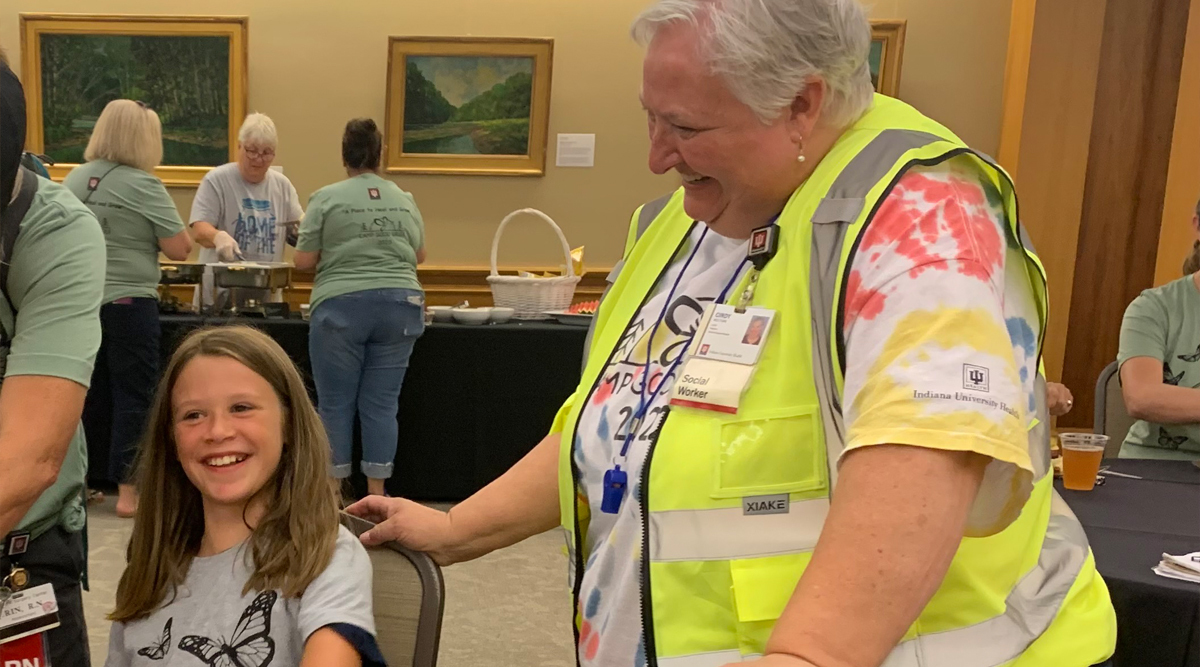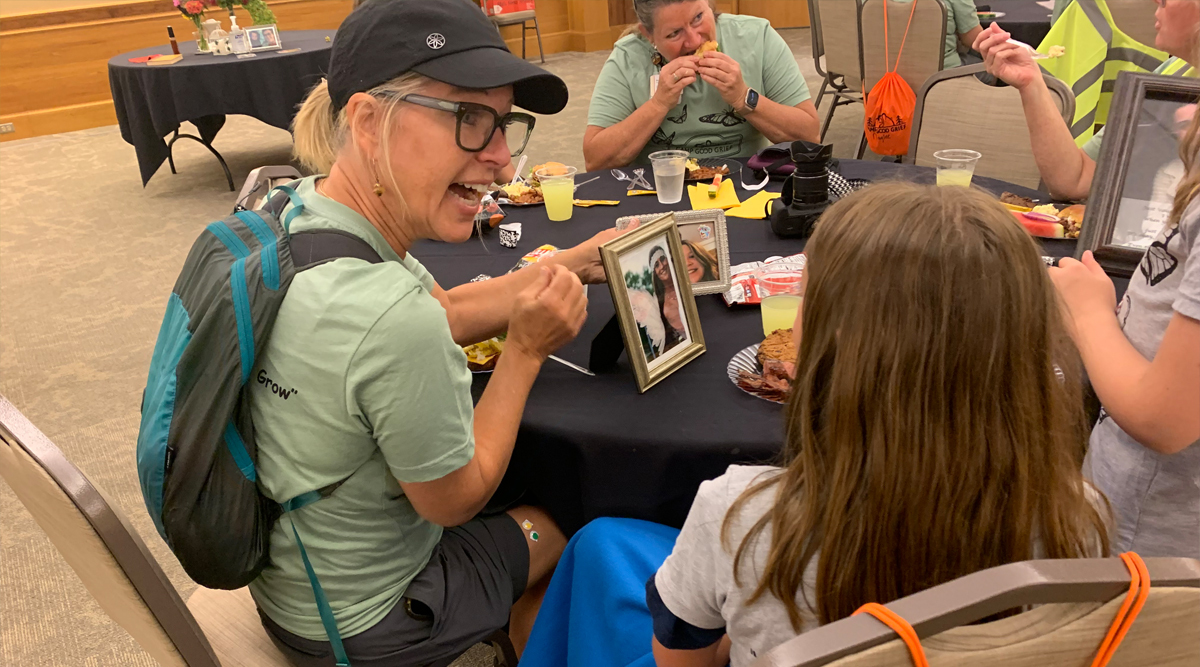Submissions are open for the 2023 CompleteLife art show at IU Health Simon Cancer Center! Patients, caregivers and team members are welcome to drop off art pieces at IU Health Simon Cancer Center until September 1, 2023. The art will then be displayed at the hospital and at various locations around Indianapolis. “If someone is going through a hardship in the hospital, that can be a real issue of control,” said Valeria Guzman, an IU Health art therapist. “[a patient may think,] I don’t have control over my situation or what I’m going through, but I want to be able to tell my story. [Art] can give them power in that way and it brings connection to the human experience.”
Month: July 2023
IU Health celebrates 20th anniversary of intestine transplant program
In July 2003, surgeons at Indiana University Health performed Indiana’s first intestine transplant, saving the life of 2-year-old David Peck. Two decades later, 22-year-old David and his mom Traci Peck reflect on this significant milestone to bring awareness to organ donation and thank his transplant team. IU Health is one of the few healthcare systems in the country that performs intestine transplants, having performed more than 300 intestine transplants for adults and children since 2003.
Evansville patient says her multiple myeloma diagnosis is a ‘win-win’
Friendship and mental health
The past four years saw increased mental health issues as isolation measures removed a key mental health component: in-person social interaction.
In recognition of National Friendship Day on Sunday, July 30, three IU Health Behavioral Health experts—Annie Cheek, LCSW, Drew Heckman, PhD, and Dayana Ferrera, LMHC—are sharing information about the importance of social interactions and friendship.
How big of an impact does loneliness have on an individual?
Cheek:
In my experience, loneliness is a huge driver of substance use and other addictive behaviors. It can frequently cause people to feel they have no connection to others or the outside world, leading them to try to connect to something else, such as a substance. People often develop a relationship with that substance and then learn to rely on it, even though it becomes problematic in their lives.
Heckman:
Humans are social creatures. We survive in the presence of loved ones with which can accomplish goals that we couldn’t on our own.
Loneliness is often an emotion we feel, designed to motivate connectedness. Unfortunately, we often tend to isolate further when these feelings arise. Moreover, we often engage in behaviors that give a false sense of connectedness, like social media.
Actual human contact is the best option, although it may feel counterintuitive.
Ferrera:
When individuals experience loneliness, they often lack social support or experience that those around them fail to see them and their needs. Lack of social support and community can contribute to feelings of depression, which can amplify isolating and withdrawing from others.
How can positive friendships impact a person’s mental health?
Cheek:
Positive friendships can bring joy, hope, and a feeling of being seen and understood. This is so important when experiencing symptoms of depression, anxiety, or feelings of loneliness.
When people are battling substance use, they often feel alone. Healthy friendships become a big part of recovery.
Heckman:
While in the presence of people with which we have a close connection, the problems in our lives seem more manageable, although still present.
Ferrera:
Studies have shown that having at least one supportive person in our lives can positively impact mental health.
The ability to have a trusted friend available for emotional support and who can listen and relate to not only one’s struggles but also be there to celebrate successes often contributes to individuals feeling connected and fosters feelings of belonging.
What is an example of a positive friendship?
Cheek:
A positive friendship is one in which we can respect each other’s boundaries, feelings and understand we don’t have to agree. We can talk through things we don’t understand and try to see from the other person’s perspective.
Share thoughts, feelings, and time together.
Heckman:
A positive friendship is one in which there is a balance of shared resources. We feel like that friend makes our life more manageable, and we do the same for them.
Ferrera:
It is one where all parties involved are able to communicate assertively about needs and boundaries, as well as deal with conflicts that arise in a respectful and open manner.
Positive friendships often lead to individuals feeling a sense of being valued and appreciated, seen and respected, encouraged to face challenges and listened to when managing difficult situations. All person’s needs and values are respected, even when they are not always shared.
What are some tips for adults who have trouble making new friends?
Cheek:
Know that many people struggle to make friends as an adult.
Try making friends at work. Join a group, class, or club to meet new people. Go to the dog park and talk to other dog owners. Find free events in the community and try to meet new people.
If you have anxiety, try to join a group with other people who have anxiety. Just remember you aren’t the only person trying to make friends and struggling with it.
Heckman:
After finishing high school, it naturally becomes harder to find friends because you’re not forced into the same situations as others. In adulthood, friends are often found in areas where people with similar interests gather.
I recommend finding a location where people with similar interests gather (like, church, the gym, in-person gaming, or yoga studios).
Ferrera:
Once you get in the presence of like-minded individuals, focusing on building a deeper understanding of personal needs, boundaries and values is a good start when it comes to starting the process of establishing new relationships.
Understanding that not all friendships can or need to have the same level of closeness or attached expectations. Being open and receptive to where other people are in their lives helps you determine who may be a good fit to have in your life.
It is ok to start by being around others without the expectation of becoming friends – just being open to being around and getting to know others can be good practice for getting to know your comfort zone and practicing interpersonal skills.
Anything else to share?
Cheek:
Friendships seem to ebb and flow. Life gets busy and hard for people, so check on your friends, and give them some grace if they’ve been a little distant for a while. It’s easier to maintain friendships if we remember that most people are doing the best they can at any given moment.
Coleman Center medical assistant has been drawing blood for more than 40 years
She was trained on the job as a phlebotomist and brought her skills to IU Health three decades ago.
By TJ Banes, IU Health Senior Journalist, tfender1@iuhealth.org
Her co-workers know her as “Mama Kim” because Kimberly “Kim” Manuel has formed such strong bonds with her patients and team members.
Manuel started working with patient EKG in 1993. A year later she joined Coleman Center for Women’s Health and she hasn’t left since. Now, as she wraps up her career in healthcare, Manuel’s co-workers share their praises for a job well done.
“I hear her conversations with patients, and she knows them personally and their families and has watched their children grow. She is my own go-to when I need a ‘mom talk,’” said medical assistant Michelle Steele.
Manuel’s role has included both patient care tech and medical assistant. Early in her career, she was involved in direct patient care. Over the years, her role focused on blood draws. She also helps order supplies, organize new doctor and patient packets and any other project that needs an extra set of experienced hands.
A graduate of Shortridge High School, Manuel first thought about pursing a career in nursing. She completed training as a Certified Nursing Assistant and then learned about the phlebotomy training at Wishard.
“I love working with the patients,” said Manuel, who recently spent time talking to patient, Kayla Nuckles who came to Coleman for a blood draw. Like many of the patients at Coleman Center, Nuckles has a history with IU Health – through pregnancy and childbirth. In May 2022, at 14 weeks, she miscarried her daughter, Penelope. Since then she has spoken openly about her loss.
“I’ve seen some of these patients over and over again,” said Manuel. Her patients know her by name and she knows each of them by name.
“She is kind and compassionate and has raised and trained many team members at Coleman over the years,” said Michelle Mackintosh, manager of Coleman Center.
“I have had many patients say they only want Kim to draw their blood. She has been such a vital, integral part of our team here at Coleman,” said Dr. Alissa Conklin.
“She’s a master at her craft of drawing blood and paying attention to details and the patient simultaneously. She knows when there is a need to distract them with stories or have someone else come in to help,” said medical assistant, Valerie Springer
Manuel said she’s going go to miss her co-workers and patients and is looking forward to starting her next chapter in retirement. She plans to enjoy time with her family – two adult children, three grandchildren and one great-grandson. She wants to spend more time exercising, learning sign language and Spanish, and creating jewelry and crafts,
Gallbladder attack turns a team member into the patient
During the first procedure of a 7 am – 5:30 pm shift, Allison Hermann, CST, started having a gallbladder attack. She briefly spoke to Jason Kennard, MD, before going down to the IU Health Bloomington Emergency Department to be admitted.
Later that day, Kennard saw her back in the operating room as the patient instead of his first assistant.
“It was actually the team I was working with in the morning,” says Hermann. “It was very comforting because I work alongside them almost every day.”
She says it only made sense to have the surgery done robotically.
“She was able to go home the exact same day,” says Dr. Kennard. “There were only four small surgical sites.”
Hermann says, “Now when I have patients come back, I let them know, ‘I just had this done too…but before you know it, you’re going to be feeling better.'”
Watch the video above to learn more.
Camp ‘Good Grief’ – A safe community to help kids cope
IU Health team members from around the state recently volunteered to staff four camps for grieving children ages 6 to 16.
By TJ Banes, IU Health Senior Journalist, tfender1@iuhealth.org
As IU Health Physician Assistant, Natalie Cooper recently joined children in a music circle, she brought with her a familiar perspective. At the age of 6, Cooper – like the other children in the circle – lost someone close to her.
“My dad died when I was young so when I heard about ‘Camp Good Grief,’ I thought it was a way I could give back,” said Cooper. “It would have been nice to have something like this when I was younger.”

Cooper volunteered for the camp in Muncie, Ind. Other camps were held in Bloomington, Indianapolis, and Lafayette. This was the first camp in Muncie attended by 10 children. IU Health started Camp Good Grief three years ago in Bloomington.
“As it has evolved the camp is able to meet and support more children and give them a chance to meet other children who are also grieving. They have a chance to learn that it’s OK to be silly or sad and to meet adults who have also lost loved ones,” said Cindy Molthan, a bereavement counselor and social worker who has been involved with all of the camps over the past three years.
During the day-long camps, children join in various sensory exercises such as crafts, yoga, and music. Working in small groups of similar ages, counselors and social workers incorporate the activities into conversations. As they sit in a gazebo in the flower garden at Muncie’s Minnetrista Center, girls are asked: “Does seeing a certain color make your feel a certain way?” And while they rest, they are coached to take a deep breath and listen to the sounds. Then they are asked, “How many different bird sounds do you hear?” and “How does it feel to recognize someone’s voice.”

The campers are recruited through the hospitals, physician offices, schools, and other agencies. They come with different experiences – the loss of a parent, grandparent, sibling or other loved one.
“We learn something new from each camper and we meet them where they are,” said Molthan. One of the children had experienced a mother’s miscarriage. The child felt the anticipation and then disappointment and confusion. Others, experienced death by tragedy and illness. The children are encouraged to bring photos of their loved ones with them to camp and talk to the adults about their loss.
“I like to volunteer and we have pediatric patients at our outpatient center so I wanted to learn more about kids and bereavement,” said Erin Leonard, a nurse at IU Health Springmill Surgery Center. As one of the campers showed her a picture of her mother, Leonard asked questions about the child’s memories.

Packets are sent home to parents in advance of the camp to give them an overview of the activities. Bereavement resources are included in the packets and whenever possible, the parents are encouraged to attend grief support groups.
“I remember when my dad died, I wanted to feel normal and that’s what’s great about this camp,” said Cooper. “These kids don’t stand out. They get a chance to see that losing somebody is a natural part of life.”
Behind the scenes: IU Health’s investment in Fishers
While construction crews are pouring concrete at the site of IU Health’s $300 million investment into the Fishers community, IU Health Saxony team members are working behind the scenes. Environmental Services and Facilities are doing their part to minimize disruptions while construction is underway inside and outside of the hospital.
Middle School teacher thankful for a teaching hospital and art therapy
Pet therapy fosters healing through kisses and cuddles
Rhett, Ashby and Mosby are a trio of dalmatians with a very serious job—besides snoozing, of course. Their task is to bring a little bit of puppy love to team members and patients across IU Health Arnett.
This trio’s human companion, Gary Nowling, a volunteer at IU Health Arnett, has been working with therapy dogs for several years and does the rigorous training himself, but he still gives Rhett, Ashby and Mosby all the credit.
“These guys do all the work,” says Nowling. “It’s just phenomenal to watch what they do and the reactions that they get.”
Nowling volunteers his time to bring Rhett, Ashby and Mosby around to anyone who might need a little boost in their day. Nowling also spends time keeping the dogs in tip-top shape so they are ready to melt hearts and provide comfort.
Take a look at the video below to learn more about Nowling’s experience and see Rhett, Ashby and Mosby in action.
